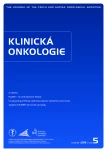-
Medical journals
- Career
Metastatic Renal Cell Carcinoma Treated with Everolimus – Data from the RENIS Clinical Registry
Authors: T. Büchler 1; L. Dušek 2; J. Fínek 3; A. Poprach 4; D. Budňáková 2; V. Kandrnal 2; Jiří Jarkovský 2; Z. Bortlíček 2; D. Klimeš 2; J. Abrahámová 1; R. Vyzula 4
Authors‘ workplace: Onkologické oddělení, Fakultní Thomayerova nemocnice a 1. lékařská fakulta Univerzity Karlovy, Praha 1; Institut biostatistiky a analýz, Lékařská a Přírodovědecká fakulta Masarykovy univerzity, Brno 2; Radioterapeutické a onkologické oddělení, Fakultní nemocnice Plzeň 3; Klinika komplexní onkologické péče, Masarykův onkologický ústav, Brno 4
Published in: Klin Onkol 2011; 24(5): 389-392
Category: Reports from Clinical Registries
Overview
Everolimus is an oral mTOR kinase inhibitor approved for the treatment of patients with metastatic renal cell carcinoma (mRCC) progressing during or after treatment with vascular endothelial growth factor (VEGF)-targeted agents. Using the national RENIS clinical registry, we have retrospectively analysed outcomes of patients treated for mRCC with everolimus. A total of 78 patients were evaluable. Median progression-free survival from the start of everolimus therapy was 7 months (95% confidence interval 2–12 months). Partial response or stable disease was achieved in 69% of patients. Treatment toxicity was predictable and serious adverse events occurred in only 6% of patients the most common being respiratory toxicity. Everolimus therapy provides significant clinical benefit for heavily pretreated mRCC patients after failure of VEGF-targeted therapy
Key words:
everolimus – renal cell carcinoma – therapy
The team of autors declares a support of Novartis.
The Editorial Board declares that the manuscript met the ICMJE “uniform requirements” for biomedical papers.Submitted:
14. 6. 2011Accepted:
18. 7. 2011
Sources
1. Motzer RJ, Escudier B, Oudard S et al. Efficacy of everolimus in advanced renal cell carcinoma: a double-blind, randomised, placebo-controlled phase III trial. Lancet 2008; 372(9637): 449–456.
2. Afinitor – souhrn infomací o přípravku. Poslední aktualizace 17. 05. 2010. European Medicines Agency. Available from: http://www.ema.europa.eu/docs/cs_CZ/document_library/EPAR_-_Product_Information/human/001038/WC500022814.pdf.
3. Dušek L, Mužík J, Gelnarová E et al. Cancer incidence and mortality in the Czech Republic. Klin Onkol 2010; 23(5): 311–324.
4. Gabardi S, Baroletti SA. Everolimus: a proliferation signal inhibitor with clinical applications in organ transplantation, oncology, and cardiology. Pharmacotherapy 2010; 30(10): 1044–1056.
5. Motzer RJ, Escudier B, Oudard S et al. Phase 3 trial of everolimus for metastatic renal cell carcinoma : final results and analysis of prognostic factors. Cancer 2010; 116(18): 4256–4265.
6. Beaumont JL, Butt Z, Baladi J et al. Patient-reported outcomes in a phase iii study of everolimus versus placebo in patients with metastatic carcinoma of the kidney that has progressed on vascular endothelial growth factor receptor tyrosine kinase inhibitor therapy. Oncologist 2011; 16(5): 632–640.
7. Buchler T, Klapka R, Melichar B et al. Sunitinib followed by sorafenib or vice versa for metastatic renal cell carcinoma – data from the Czech registry. Ann Oncol. 2011. Epub ahead of print.
8. White DA, Camus P, Endo M et al. Noninfectious pneumonitis after everolimus therapy for advanced renal cell carcinoma. Am J Respir Crit Care Med 2010; 182(3): 396–403.
Labels
Paediatric clinical oncology Surgery Clinical oncology
Article was published inClinical Oncology

2011 Issue 5-
All articles in this issue
- Hsp90 – a Target for Anticancer Therapy
- Neoadjuvant Chemoradiotherapy of Rectal Carcinoma with Bevacizumab
- What Patients Need to Know before Their Breast Cancer Surgery
- Neuroendoscopic Biopsy of a Brain Tumor
- Adaptive IG-IMRT for Prostate Cancer
- Partial Regression of CNS Lesions of Erdheim-Chester Disease after Treatment with 2-chlorodeoxadenosine and Their Full Remission Following Treatment with Lenalidomide
- Secondary Angiosarcomas after Conservation Treatment for Breast Cancers
- Metastatic Renal Cell Carcinoma Treated with Everolimus – Data from the RENIS Clinical Registry
- Cetuximab Enhances the Anti-proliferative Effect of Trastuzumab in ERBB2 Over-expressing Breast Cancer Cells – Preliminary Study
- Clinical Oncology
- Journal archive
- Current issue
- Online only
- About the journal
Most read in this issue- Partial Regression of CNS Lesions of Erdheim-Chester Disease after Treatment with 2-chlorodeoxadenosine and Their Full Remission Following Treatment with Lenalidomide
- Neuroendoscopic Biopsy of a Brain Tumor
- Secondary Angiosarcomas after Conservation Treatment for Breast Cancers
- What Patients Need to Know before Their Breast Cancer Surgery
Login#ADS_BOTTOM_SCRIPTS#Forgotten passwordEnter the email address that you registered with. We will send you instructions on how to set a new password.
- Career

